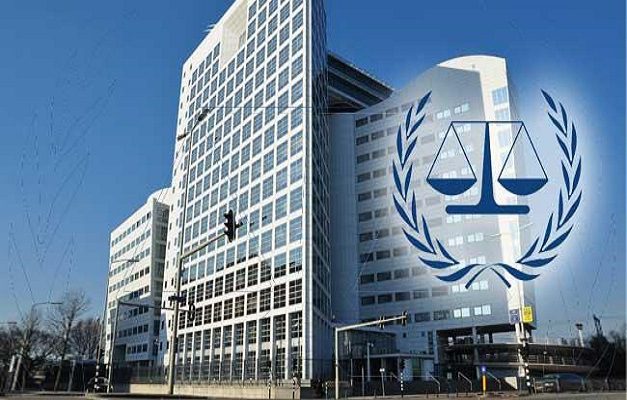Global Issues
The Concept Of International Crimes: An Introduction -By Oyetola Muyiwa Atoyebi & Patrick Emmanuel
International crimes are serious crimes that shock the conscience of humanity. As explained in this article, they are grave, heinous and the worst kind of atrocities. Regrettably, many of these violations of international law remained unpunished before the establishment of Courts and tribunals to try them.

International crimes are simply the most serious crimes that are of concern to the international community. They are heinous crimes that affect large swathes of humanity. The International Criminal Court (ICC) was established to investigate, prosecute and try individuals accused of committing these crimes, namely the crime of genocide, crimes against humanity and war crimes.
INTRODUCTION
After the Second World War which took place between 1939-1945[1], the Allied powers[2] (Great Britain, France, Soviet Union, the United States and China), launched the first international war crimes tribunal, known as the “Nuremberg Trials”[3], to prosecute top Nazi officials. Then in the 1990s, national governments came up with the idea of a permanent Court to hold perpetrators of international crimes to account. The United Nations (UN) had previously set up ad-hoc international criminal tribunals to deal with war crimes in the former Yugoslavia and Rwanda, but many international law experts considered them inefficient and inadequate deterrents.
Specifically, Trinidad and Tobago requested that the UN commission looks into the creation of a permanent Court in 1989, which necessitated the Rome Statute of 1998.Years after the request was made, such efforts gained support, especially in Europe and Africa, and the International Criminal Court (ICC) was established. The ICC, established in 2002, seeks to hold to account those guilty of some of the world’s worst crimes, these crimes include war crimes, genocide, crimes against humanity and crime of aggression. Believers in the purpose of the Court say it deters would-be war criminals, bolsters the rule of law, and offers justice to victims of atrocities.
This disquisition seeks to explain the concept of international crimes, the types of international crimes, and the idea behind the creation of the International Criminal Court.
WHAT ARE INTERNATIONAL CRIMES?
International crimes are simply the most serious crimes that are of concern to the international community. They are heinous crimes that affect large swathes of humanity. The International Criminal Court (ICC) was established to investigate, prosecute and try individuals accused of committing these crimes, namely the crime of genocide, crimes against humanity and war crimes.[4] The Court’s establishment is provided for in Article 1 of the Rome Statute:
An International Criminal Court (the Court) is hereby established. It shall be a permanent institution and shall have the power to exercise its jurisdiction over persons for the most serious crimes of international concern, as referred to in this Statute, and shall be complementary to national criminal jurisdictions. The jurisdiction and functioning of the Court shall be governed by the provisions of this Statute.[5]
The background of the establishment of the Court can be traced to the twentieth-century conflicts when some of the most heinous crimes were committed. Regrettably, many of these violations of international law have remained unpunished. The ICC was therefore established as a permanent Court to try these atrocities. It has the mandate to try individuals rather than States, and to hold such persons accountable for the most serious crimes of concern to the international community as a whole. These are crimes of genocide, crimes against humanity, war crimes and crime of aggression.
Genocide
Raphael Lemkin coined the term in 1944[6], combining the Greek word γένος (genos, race, people) with the Latin suffix -caedo (the act of killing).He believed that if he could find the right word that would unite people, it would ignite people to come together to stop these crimes.
According to Article 6 of the Rome Statute, “genocide” means any of the following acts committed with the intent to destroy, in whole or in part, a national, ethnical, racial, or religious group.
- Killing members of the group.
- Causing serious bodily or mental harm to members of the group.
- deliberately inflicting on the group conditions of life calculated to bring about its physical destruction in whole or in part.
- Imposing measures intended to prevent births within the group.
- Forcibly transferring children of the group to another group.
This definition of genocide is based on the definition found in the 1948 United Nations Convention, on the Prevention and Punishment of the Crime of Genocide, which confirmed genocide as a crime under international law in the aftermath of the Holocaust.[7]
Crimes Against Humanity
Article 7 prohibits “Crimes against humanity” which include any of the following acts committed as part of a widespread or systematic attack directed against any civilian population, with knowledge of the attack
- Murder.
- Extermination.
- Enslavement.
- Deportation or forcible transfer of population.
- Imprisonment or other severe deprivation of physical liberty in violation of fundamental rules of international law.
- Torture.
- Rape, sexual slavery, enforced prostitution, forced pregnancy, enforced sterilization, or any other form of sexual violence of comparable gravity.
- Persecution against any identifiable group or collectivity on political, racial, national, ethnic, cultural, religious, gender, or other grounds that are universally recognized as impermissible under international law, in connection with any act referred to in this paragraph or any crime within the jurisdiction of the Court.
- Enforced disappearance of persons.
- The crime of apartheid.
- Other inhumane acts of a similar character intentionally causing great suffering, or serious injury to the body ormental or physical health.
War Crimes
War crimes cover grave breaches of the Geneva Conventions and other serious violations of the laws and customs applicable in international armed conflict, and in conflicts “not of an international character” listed in Article 8 of the Rome Statute, when they are committed as part of a plan, or policy, or on a large scale. These prohibited acts include;
- murder;
- mutilation, cruel treatment, and torture;
- taking of hostages;
- intentionally directing attacks against the civilian population;
- intentionally directing attacks against buildings dedicated to religion, education, art, science or charitable purposes, historical monuments or hospitals;
- pillaging;
- rape, sexual slavery, forced pregnancy or any other form of sexual violence;
- conscripting or enlisting children under the age of 15 years into armed forces or groups or using them to participate actively in hostilities among others.
Crime of Aggression
An amendment to Article 8 was adopted on 11th July, 2010, at the Review Conference of the Rome Statute in Kampala, Uganda. This amendment which has now been ratified by 41 states as of February, 2021, covers the definition and conditions for the crime of aggression.
Crime of aggression is now defined in Article 8 bis (second) of the Rome Statute as the planning, preparation, initiation or execution, by a person in a position effectively to exercise control over or to direct the political or military action of a State, of an act of aggression which, by its character, gravity, and scale, constitutes a manifest violation of the Charter of the United Nations. An act of aggression refers to the use of armed force by a State against the sovereignty, territorial integrity or political independence of another State, or in any other manner inconsistent with the Charter of the United Nations.
Article 8 bis (1) also provides that any of the following acts, regardless of a declaration of war, shall, in accordance with United Nations General Assembly resolution 3314 (XXIX) of 14thDecember, 1974, qualify as an act of aggression:
- The invasion or attack by the armed forces of a State of the territory of another State, or any military occupation, however temporary, resulting from such invasion or attack, or any annexation by the use of force of the territory of another State or part thereof.
- Bombardment by the armed forces of a State against the territory of another State or the use of any weapons by a State against the territory of another State.
- The blockade of the ports or coasts of a State by the armed forces of another State.
- An attack by the armed forces of a State on the land, sea or air forces, or marine and air fleets of another State.
- The use of armed forces of one State which are within the territory of another State with the agreement of the receiving State, in contravention of the conditions provided for in the agreement, or any extension of their presence in such territory beyond the termination of the agreement.
- The action of a State in allowing its territory, which it has placed at the disposal of another State, to be used by that other State for perpetrating an act of aggression against a third State.
- The sending by or on behalf of a State of armed bands, groups, irregulars or mercenaries, which carry out acts of armed force against another State of such gravity as to amount to the acts listed above, or its substantial involvement therein.
CONCLUSION
International crimes are serious crimes that shock the conscience of humanity. As explained in this article, they are grave, heinous and the worst kind of atrocities. Regrettably, many of these violations of international law remained unpunished before the establishment of Courts and tribunals to try them. Steps were however taken by national governments to remedy this with the establishment of the International Criminal Court, which has the jurisdiction to investigate, prosecute, and ensure that these crimes no longer go unpunished.
AUTHOR: Oyetola Muyiwa Atoyebi, SAN, FCIArb. (UK).
Mr. Oyetola Muyiwa Atoyebi, SAN is the Managing Partner of O. M. Atoyebi, S.A.N & Partners (OMAPLEX Law Firm) where he also doubles as the Team Lead of the Firm’s Emerging Areas of Law Practice.
Mr. Atoyebi has expertise in and a vast knowledge of International Law and this has seen him advise and represent his vast clientele in a myriad of high level transactions. He holds the honour of being the youngest lawyer in Nigeria’s history to be conferred with the rank of a Senior Advocate of Nigeria.
He can be reached at atoyebi@omaplex.com.ng
CONTRIBUTOR: Patrick Emmanuel.
Patrick is a member of the Dispute Resolution Team at OMAPLEX Law Firm. He also holds commendable legal expertise in Public International Law and International Humanitarian Law.
He can be reached at patrick.emmanuel@omaplex.com.ng.
[1]‘World war II summary’ available at www.history.com/topics/world-war-ii/world-war-ii-history accessed 18 July, 2022.
[2] ‘Allied powers, International Alliance’ available at www.history.com/topics/world-war-ii/world-war-ii-history accessed 18 July, 2022.
[3]https://www.history.com/topics/world-war-ii/nuremberg-trials accessed 17 July, 2022.
[4]The International Criminal Court, ‘Understanding the International Criminal Court’ available at https://www.icc-cpi.int/resource-library accessed 11 July 2021.
[5] Rome Statute of the International Criminal Court, 17 July 1998, UN Doc. A/CONF.183/9.
[6]Raphael Lemkin and the Concept of Genocidehttps://www.jstor.org/stable/j.ctv2t4ds5 accessed 18 July, 2022.
[7] Human Rights Watch (n 82) 5




















